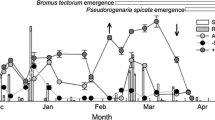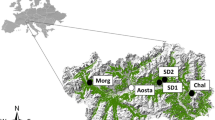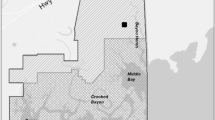Abstract
The persistence and distribution of species under changing climates can be affected by both direct effects of the environment and indirect effects via biotic interactions. However, the relative importance of direct and indirect climate effects on recruitment stages is poorly understood. We conducted a manipulative experiment to test the multiway interaction of direct and competition-mediated effects of climate change on vegetation dynamics. Following stand-replacing fire in California mixed-conifer forest, we seeded two conifer species, Pinus ponderosa and Abies concolor, in two consecutive years, one relatively normal and the other with an unusually wet and snowy winter followed by a hot summer. We additionally manipulated snow amount and competitive environment for both years. We found the effects of the snowpack treatment were contingent upon other abiotic factors (year of seeding) and biotic factors (shrub competition). Under ambient snowpack, shrubs reduced recruitment of P. ponderosa seedlings, but this negative effect disappeared with reduced snowpack. Additionally, the effects of shrubs on seedlings differed between cohorts and by life stage. In a warmer future, decreased snowpack may increase seedling emergence, but hotter and drier summers will decrease seedling survival; the effects of shrubs on conifers may become less negative as temperatures increase.





Similar content being viewed by others
References
AghaKouchak A, Cheng L, Mazdiyasni O, Farahmand A (2014) Global warming and changes in risk of concurrent climate extremes: insights from the 2014 California drought. Geophys Res Lett 41:8847–8852. https://doi.org/10.1002/2014GL062308
Allen CD, Breshears DD (1998) Drought-induced shift of a forest-woodland ecotone: rapid landscape response to climate variation. Proc Natl Acad Sci 95:14839–14842. https://doi.org/10.1073/pnas.95.25.14839
Allen CD, Macalady AK, Chenchouni H, Bachelet D, McDowell N, Vennetier M, Kitzberger T, Rigling A, Breshears DD, Hogg EHT, Gonzalez P, Fensham R, Zhang Z, Castro J, Demidova N, Lim JH, Allard G, Running SW, Semerci A, Cobb N (2010) A global overview of drought and heat-induced tree mortality reveals emerging climate change risks for forests. For Ecol Manag 259:660–684. https://doi.org/10.1002/2014GL062308
Barbour MG, Fernau RF, Benayas JMR, Jurjavcic N, Royce EB (1998) Tree regeneration following clearcut logging in red fir forests of California. For Ecol Manag 104:101–111. https://doi.org/10.1016/S0378-1127(97)00244-2
Barker JE (2011) Diurnal patterns of water potential in Abies concolor and Pinusponderosa. Can J For Res 3:556–564. https://doi.org/10.1139/x73-082
Barnett TP, Adam JC, Lettenmaier DP (2005) Potential impacts of a warming climate on water availability in snow-dominated regions. Nature 438:303–309. https://doi.org/10.1016/S0378-1127(97)00244-2
Barton K (2017) MuMIn: multi-model inference. R package version 1.40.0. https://CRAN.R-project.org/package=MuMIn. Accessed 27 Apr 2019
Bates D, Maechler M, Bolker B, Walker S (2015) Fitting linear mixed-effects models using lme4. J Stat Softw 67:1–48. https://doi.org/10.18637/jss.v067.i01
Bertness MD, Callaway R (1994) Positive interactions in communities. Trends Ecol Evol 9:191–193. https://doi.org/10.1016/0169-5347(94)90088-4
Buck JM, Adams RS, Cone J, Conkle MT, Libby WJ, Eden CJ, Knight MJ (1970) California tree seed zones. U.S. Forest Service, San Francisco
Chamberlain SA, Bronstein JL, Rudgers JA (2014) How context dependent are species interactions? Ecol Lett 17:881–890. https://doi.org/10.1111/ele.12279
Chase JM (2003) Community assembly: when should history matter? Oecologia 136:489–498. https://doi.org/10.1007/s00442-003-1311-7
Cook BI, Ault TR, Smerdon JE (2015) Unprecedented 21st century drought risk in the American Southwest and Central Plains. Sci Adv 1:e1400082. https://doi.org/10.1126/sciadv.1400082
Diffenbaugh NS, Swain DL, Touma D (2015) Anthropogenic warming has increased drought risk in California. Proc Natl Acad Sci USA 112:3931–3936. https://doi.org/10.1073/pnas.1422385112
Doak DF, Morris WF (2010) Demographic compensation and tipping points in climate-induced range shifts. Nature 467:959. https://doi.org/10.1038/nature09439
Dobrowski SZ, Swanson A, Abatzoglou J, Holden Z, Safford H, Schwartz M, Gavin D (2015) Forest structure and species traits mediate projections of climate-driven recruitment declines in western US tree species. Glob Ecol Biogeogr 24:917–927. https://doi.org/10.1111/geb.12302
Dodson EK, Root HT (2013) Conifer regeneration following stand-replacing wildfire varies along an elevation gradient in a ponderosa pine forest, Oregon, USA. For Ecol Manag 302:163–170. https://doi.org/10.1016/j.foreco.2013.03.050
Donato DC, Harvey BJ, Turner MG (2016) Regeneration of montane forests 24 years after the 1988 Yellowstone fires: a fire-catalyzed shift in lower treelines? Ecosphere 7:e01410. https://doi.org/10.1002/ecs2.1410
Ettinger A, HilleRisLambers J (2017) Competition and facilitation may lead to asymmetric range shift dynamics with climate change. Glob Change Biol 23:3921–3933. https://doi.org/10.1111/gcb.13649
Feddema JJ, Mast JN, Savage M (2013) Modeling high-severity fire, drought and climate change impacts on ponderosa pine regeneration. Ecol Model 253:56–69. https://doi.org/10.1016/j.ecolmodel.2012.12.029
Gómez-Aparicio L, Zamora R, Gómez JM (2004) Applying plant facilitation to forest restoration: a meta-analysis of the use of shrubs as nurse plants. Ecol Appl 14:1128–1138. https://doi.org/10.1890/03-5084
Gómez-Aparicio L, Gómez JM, Zamora R, Boettinger JL (2005) Canopy vs. soil effects of shrubs facilitating tree seedlings in Mediterranean montane ecosystems. J Veg Sci 16:191–198. https://doi.org/10.1111/j.1654-1103.2005.tb02355.x
Gray AN, Zald HSJ, Kern RA, North M (2005) Stand conditions associated with tree regeneration in Sierran mixed-conifer forests. For Sci 51:198–210
Grolemund G, Wickham H (2011) Dates and times made easy with lubridate. J Stat Softw 40:1–25
Harvey BJ, Donato DC, Turner MG (2016) High and dry: post-fire tree seedling establishment in subalpine forests decreases with post-fire drought and large stand-replacing burn patches. Glob Ecol Biogeogr 25:655–669. https://doi.org/10.1111/geb.12443
HilleRisLambers J, Harsch MA, Ettinger AK, Ford KR, Theobald EJ (2013) How will biotic interactions influence climate change-induced range shifts? Ann N Y Acad Sci 1297:112–125. https://doi.org/10.1111/nyas.12182
Holmgren M, Gómez-Aparicio L, Quero JL, Valladares F (2011) Non-linear effects of drought under shade: reconciling physiological and ecological models in plant communities. Oecologia 169:293–305. https://doi.org/10.1007/s00442-011-2196-5
Jackson ST, Betancourt JL (2009) Ecology and the ratchet of events: climate variability, niche dimensions, and species distributions. PNAS 106:19685–19692. https://doi.org/10.1073/pnas.0901644106
Kassambara A, Kosinski M (2018) survminer: drawing survival curves using ‘ggplot2’. R package version 0.4.3. https://CRAN.R-project.org/package=survminer
Kelly AE, Goulden ML (2008) Rapid shifts in plant distribution with recent climate change. Proc Natl Acad Sci 105:11823–11826. https://doi.org/10.1073/pnas.0802891105
Kitzberger T, Steinaker DF, Veblen TT (2000) Effects of climatic variability on facilitation of tree establishment in northern Patagonia. Ecology 81:1914–1924. https://doi.org/10.1890/0012-9658(2000)081%5b1914:eocvof%5d2.0.co;2
Liang S, Hurteau MD, Westerling AL (2016) Response of Sierra Nevada forests to projected climate-wildfire interactions. Glob Change Biol 23:2016–2030. https://doi.org/10.1111/gcb.13544
Little RL, Peterson DL, Conquest LL (1994) Regeneration of subalpine fir (Abies lasiocarpa) following fire: effects of climate and other factors. Can J For Res 24:934–944. https://doi.org/10.1139/x94-123
Lundquist JD, Lott F (2008) Using inexpensive temperature sensors to monitor the duration and heterogeneity of snow-covered areas. Water Resour Res. https://doi.org/10.1029/2008WR007035
MacDougall AS, Wilson SD, Bakker JD (2008) Climatic variability alters the outcome of long-term community assembly. J Ecol 96:346–354. https://doi.org/10.1111/j.1365-2745.2007.01333.x
Maestre FT, Callaway RM, Valladeres F, Lortrie CJ (2009) Refining the stress-gradient hypothesis for competition and facilitation in plant communities. J Ecol 97:199–205. https://doi.org/10.1111/j.1365-2745.2008.01476.x
McDonald PM, Everest GA (1996) Response of young ponderosa pines, shrubs, and grasses to two release treatments. Department of Agriculture, Forest Service, Pacific Southwest Research Station, Albany. https://doi.org/10.2737/PSW-RN-419
McDonald PM, Fiddler GO (2010) Twenty-five years of managing vegetation in conifer plantations in northern and central California: results, application, principles, and challenges. Department of Agriculture, Forest Service, Pacific Southwest Research Station, Albany. https://doi.org/10.2737/PSW-GTR-231
North MP, Collins BM, Safford HD, Stephenson NL (2016) Montane forests. In: Mooney HA, Zavaleta E (eds) Ecosystems of California. University of California Press, Berekely, pp 553–577
Oakley BB, North MP, Franklin JF (2006) Facilitative and competitive effects of a N-fixing shrub on white fir saplings. For Ecol Manag 233:100–107. https://doi.org/10.1016/j.foreco.2006.06.014
Pinheiro J, Bates D, DebRoy S, Sarkar D, R Core Team (2017) nlme: linear and nonlinear mixed effects models. R package version 3.1-131. https://CRAN.R-project.org/package=nlme. Accessed 27 Apr 2019
PRISM Climate Group (2016) August. http://prism.oregonstate.edu. Accessed 8 Feb 2018
Putz FE, Canham CD (1992) Mechanisms of arrested succession in shrublands: root and shoot competition between shrubs and tree seedlings. For Ecol Manag 49:267–275. https://doi.org/10.1016/0378-1127(92)90140-5
R Core Team (2017) R: a language and environment for statistical computing. R Foundation for Statistical Computing, Vienna, Austria. https://www.R-project.org/. Accessed 27 Apr 2019
Rother MT, Veblen TT (2016) Limited conifer regeneration following wildfires in dry ponderosa pine forests of the Colorado Front Range. Ecosphere 7:e01594. https://doi.org/10.1002/ecs2.1594
Rother MT, Veblen TT, Furman LG (2015) A field experiment informs expected patterns of conifer regeneration after disturbance under changing climate conditions. Can J For Res 45:1607–1616. https://doi.org/10.1139/cjfr-2015-0033
Royo AA, Carson WP (2006) On the formation of dense understory layers in forests worldwide: consequences and implications for forest dynamics, biodiversity, and succession. Can J For Res 36:1345–1362. https://doi.org/10.1139/x06-025
Safford HD, Stevens JT (2017) Natural range of variation for yellow pine and mixed-conifer forests in the Sierra Nevada, southern Cascades, and Modoc and Inyo National Forests, California, USA. http://fs.usda.gov
Santala K, Aubin I, Hoepting M, Bachand M, Pitt D (2019) Managing conservation values and tree performance: lessons learned from 10 year experiments in regenerating eastern pine (Pinus strobus L.). For Ecol Manag 432:748–760. https://doi.org/10.1016/j.foreco.2018.09.038
Savage M, Mast JN (2005) How resilient are southwestern ponderosa pine forests after crown fires? Can J For Res 35:967–977. https://doi.org/10.1139/x05-028
Serra-Diaz JM, Franklin J, Sweet LC, McCullough IM, Syphard AD, Regan HM, Flint LE, Flint AL, Dingman JR, Moritz MA, KmRedmond L Hannah, Davis FW (2015) Averaged 30 year climate change projections mask opportunities for species establishment. Ecography 39:844–845. https://doi.org/10.1111/ecog.02074
Shainsky LJ, Radosevich SR (1986) Growth and water relations of Pinus ponderosa seedlings in competitive regimes with Arctostaphylos patula seedlings. J Appl Ecol 23:957. https://doi.org/10.2307/2403947
Stevens JT, Latimer AM (2015) Snowpack, fire, and forest disturbance: interactions affect montane invasions by non-native shrubs. Glob Change Biol 21:2379–2393. https://doi.org/10.1111/gcb.12824
Stevens-Rumann CS, Kemp KB, Higuera PE, Harvey BJ, Rother MT, Donato DC, Morgan P, Veblen TT (2018) Evidence for declining forest resilience to wildfires under climate change. Ecol Lett 21:243–252. https://doi.org/10.1111/ele.12889
Sthultz CM, Gehring CA, Whitham TG (2007) Shifts from competition to facilitation between a foundation tree and a pioneer shrub across spatial and temporal scales in a semiarid woodland. New Phytol 173:135–145. https://doi.org/10.1111/j.1469-8137.2006.01915.x
Stuble KL, Fick SE, Young TP (2017a) Every restoration is unique: testing year effects and site effects as drivers of initial restoration trajectories. J Appl Ecol 54:1051–1057. https://doi.org/10.1111/1365-2664.12861
Stuble KL, Zefferman EP, Wolf KM, Vaughn KJ, Young TP (2017b) Outside the envelope: rare events disrupt the relationship between climate factors and species interactions. Ecology 98:1623–1630. https://doi.org/10.1002/ecy.1820
Tepley AJ, Thompson JR, Epstein HE, Anderson-Teixeira KJ (2017) Vulnerability to forest loss through altered postfire recovery dynamics in a warming climate in the Klamath Mountains. Glob Change Biol 23:4117–4132. https://doi.org/10.1111/gcb.13704
Therneau T (2015) A package for survival analysis in S. version 2.38. https://CRAN.R-project.org/package=survival. Accessed 27 Apr 2019
Therneau T, Grambsch PM (2000) Modeling survival data: extending the cox model. Springer, New York
Urza AK, Sibold JS (2017) Climate and seed availability initiate alternate post-fire trajectories in a lower subalpine forest. J Veg Sci 28:43–56. https://doi.org/10.1111/jvs.12465
Vaughn KJ, Young TP (2010) Contingent conclusions: year of initiation influences ecological field experiments, but temporal replication is rare. Restor Ecol 18:59–64. https://doi.org/10.1111/j.1526-100X.2010.00714.x
Wagner RG, Little KM, Richardson B, Mcnabb K (2006) The role of vegetation management for enhancing productivity of the world’s forests. Forestry 79:57–79. https://doi.org/10.1093/forestry/cpi057
Welch KR, Safford HD, Young TP (2016) Predicting conifer establishment post wildfire in mixed conifer forests of the North American Mediterranean-climate zone. Ecosphere 7:e01609. https://doi.org/10.1002/ecs2.1609
Wickham H (2009) ggplot2: elegant graphics for data analysis. Springer, New York
Wickham H (2011) The split-apply-combine strategy for data analysis. J Stat Softw 40:1–29
Wickham H (2017) tidyverse: easily install and load the ‘tidyverse’. R package version 1.2.1. https://CRAN.R-project.org/package=tidyverse. Accessed 27 Apr 2019
Wilke CO (2019) cowplot: streamlined plot theme and plot annotations for ‘ggplot2’. R package version 0.9.4. https://CRAN.R-project.org/package=cowplot. Accessed 27 Apr 2019
Young TP, Stuble KL, Balachowski JA, Werner CM (2016) Using priority effects to manipulate competitive relationships in restoration. Restor Ecol 25:S114–S123. https://doi.org/10.1111/rec.12384
Young DJN, Stevens JT, Earles JM, Moore J, Ellis A, Jirka AL, Latimer AM (2017) Long-term climate and competition explain forest mortality patterns under extreme drought. Ecol Lett 20:78–86. https://doi.org/10.1111/ele.12711
Young DJN, Werner CM, Welch KR, Young TP, Safford HD, Latimer AM (2018) Post-fire forest regeneration shows limited climate tracking and potential for drought-induced type conversion. Ecology 100:e02571. https://doi.org/10.1002/ecy.2571
Acknowledgements
This work was funded by Henry A. Jastro Graduate Research Awards, a University of California Davis Department of Plant Sciences MacDonald Fellowship, and a National Science Foundation Graduate Research Fellowship (to CW). Site location and research permissions were obtained with the help of Dana Walsh of the US Forest Service, and herbicide application was conducted under the supervision of Kurt Vaughn. We are grateful to University of California Davis students who assisted with fieldwork. Finally, we thank two anonymous reviewers and editor Kendi Davies for their detailed feedback on this manuscript.
Funding
This work was funded by Henry A. Jastro Graduate Research Awards, a University of California Davis Department of Plant Sciences MacDonald Fellowship, and a National Science Foundation Graduate Research Fellowship (to CW).
Author information
Authors and Affiliations
Contributions
CW, HS, and TY conceived the ideas and designed methodology; CW collected the data; CW and DY analyzed the data; CW led the writing of the manuscript. All authors contributed critically to the drafts and gave final approval for publication.
Corresponding author
Ethics declarations
Conflict of interest
The authors declare that they have no conflict of interest.
Data and code
Data and R code are available in a figshare repository, https://doi.org/10.6084/m9.figshare.3172468.
Additional information
Communicated by Kendi Davies.
Climate change has the potential to shift the balance between species regenerating after fire. We experimentally tested the effects of climate change on post-fire regeneration and shifts in species interactions. We found that the effects of climate manipulation on conifer regeneration differ depending on year of planting and interactions with neighboring plants. This demonstrates the importance of experiments initiated across multiple years in teasing apart abiotic and biotic components of climate change impacts.
Electronic supplementary material
Below is the link to the electronic supplementary material.
Rights and permissions
About this article
Cite this article
Werner, C.M., Young, D.J.N., Safford, H.D. et al. Decreased snowpack and warmer temperatures reduce the negative effects of interspecific competitors on regenerating conifers. Oecologia 191, 731–743 (2019). https://doi.org/10.1007/s00442-019-04536-4
Received:
Accepted:
Published:
Issue Date:
DOI: https://doi.org/10.1007/s00442-019-04536-4




